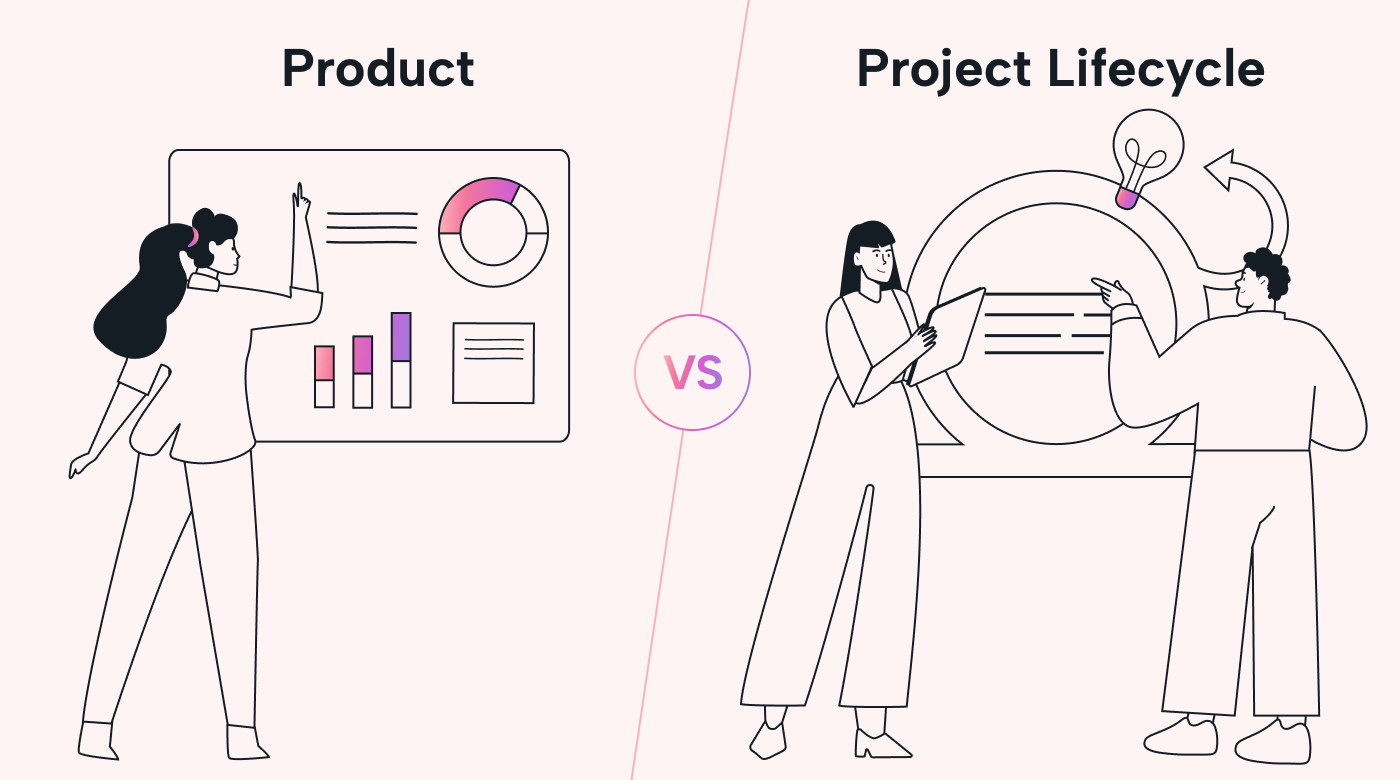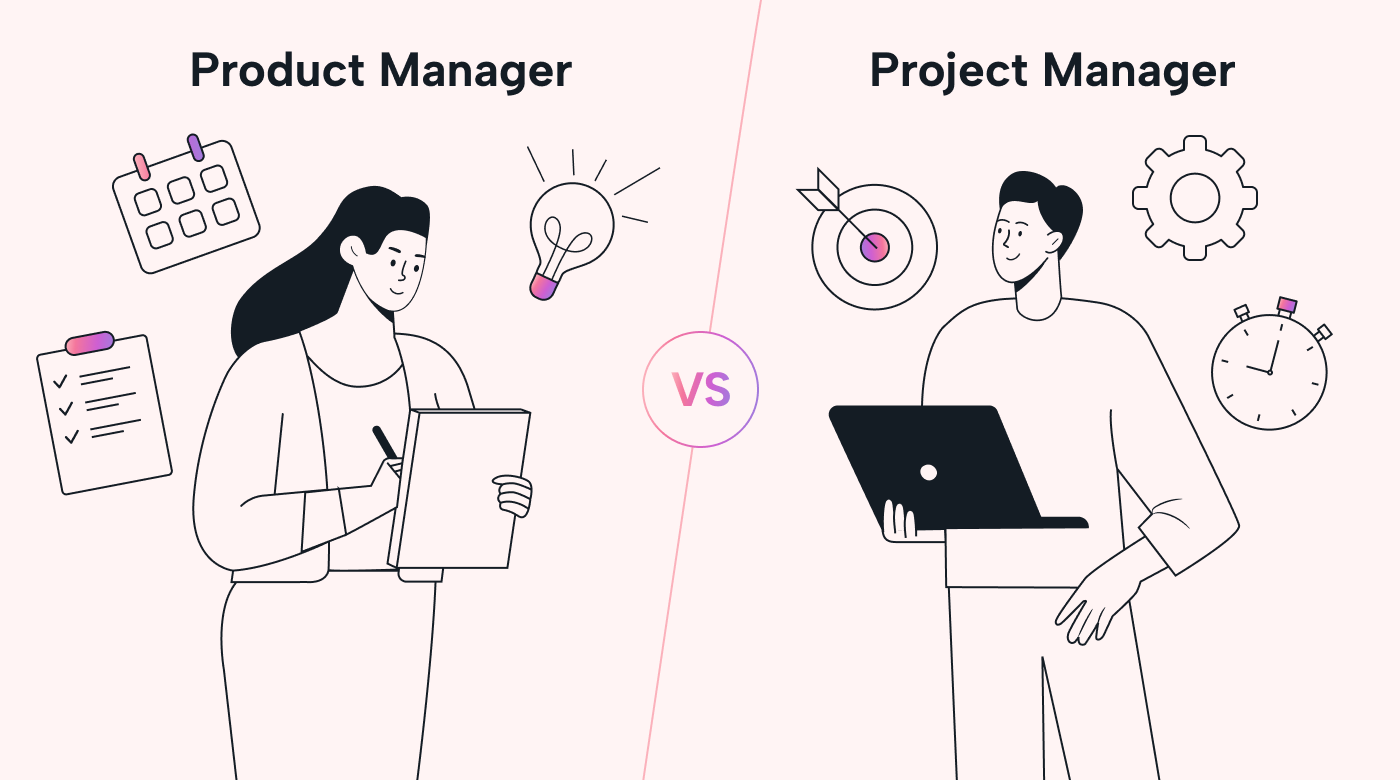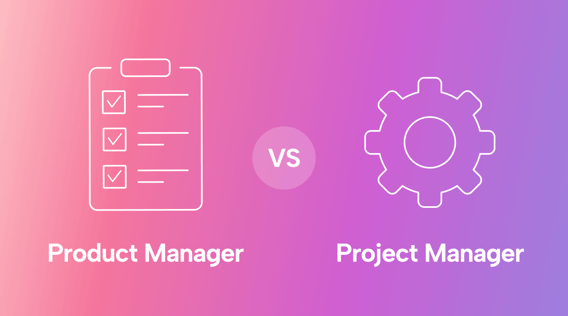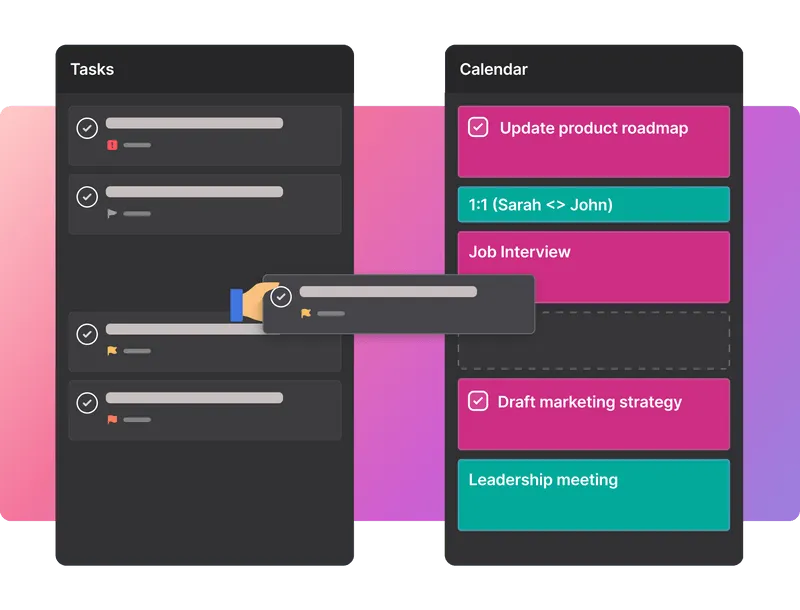Do you need help deciding between project vs. product management?
It can be overwhelming to understand the differences between product and project managers, and how each contributes to the success of a project.
This guide dives into product and project managers’ contrasting worlds. We’ll explore their roles, responsibilities, and unique contributions. We’ll also look at their key differences and similarities. And we’ll show you how to choose the right path for you and your team.
Let’s get started.
The difference between a product and a project lifecycle
In today’s world, you'll often come across terms like product and project lifecycles. While they may sound similar, they represent different approaches and objectives.
 |
The product lifecycle is about the entire journey of a product, from concept to retirement. It's a continuous process that involves constant refinement, and adaptation based on customer feedback. Product managers are the navigators that steer the success of this lifecycle.
On the other hand, project lifecycles are finite and goal-oriented. They focus on specific activities and deliverables. Project managers take charge of this process and lead the team to success.
What is a product manager?
A product manager makes sure the product meets its goals throughout its lifecycle. They play a strategic and pivotal role in ensuring the product meets market demands and achieves its objectives.
Product managers make strategic decisions based on customer feedback, market research, and data analysis. They use this information to plan to increase the product’s value proposition.
They also serve as the bridge between the business, development teams, and customers.
Product managers are accustomed to Agile environments, and using Agile methods to fulfill their duties.
What does a product manager do?
The product manager’s core duties revolve around the following:
- Market research
- Defining the product's vision
- Creating product roadmaps that guide its development
A day in the life of a product manager is dynamic. They conduct extensive user research to understand customer needs and choices. They prioritize features based on market demand and business goals. Likewise, they work with development teams to bring the product to life.
Product managers also oversee and plan product launches.
Here are some other key tasks and activities of a product manager:
- Conduct user interviews and gather feedback to validate product ideas
- Collaborate with UX/UI designers to create intuitive and user-friendly interfaces
- Develop pricing strategies and conduct pricing analysis for the product
- Identify opportunities for partnerships and strategic alliances
- Monitor market trends and competitor activities
- Define and track key performance indicators (KPIs) to measure product success
What is a project manager?
A project manager plays a vital role in the successful execution of projects. They focus on the tactical planning, execution, and delivery of projects. They do this while adhering to scope, budget, and timeline constraints.
Project managers use project management methodologies, such as Agile or Waterfall, to structure and guide their work. These methodologies provide frameworks for project planning, collaboration, and decision-making.
Project management methods play a role in the success and competitiveness of businesses. According to 90% of senior executives, it’s critical to delivering successful projects, making the role of a project manager a demanding job.
What does a project manager do?
Project managers are responsible for various key functions. They define project goals, scope, and deliverables, and then plan out the execution of the project. Project managers are also responsible for resource allocation and teamwork, including task assignments and managing team members’ workloads.
Project managers also need strong risk management skills to identify and mitigate potential issues.
On a typical day, a project manager's duties can include:
- Conduct project status meetings
- Track project timelines and milestones
- Collaborate with stakeholders
- Manage resources
- Track project budgets, expenses, and financials
- Identify and manage project risks
- Facilitate communication and coordination
- Resolve conflicts or issues
- Document project updates, tasks, and decisions for future reference
- Coordinate procurement activities
- Run quality assurance activities
- Lead change management efforts
Product manager vs. project manager: key differences
There are a few key differences between the product manager and project manager roles.
 |
Let’s take a look at the most important differences.
Visionary vs. execution
Product managers serve are the visionaries, driving the long-term success of a product. They define the product strategy, envision its future, and guide its development.
Project managers, on the other hand, focus on the execution of projects. They oversee day-to-day operations, coordinate resources, and transform the vision into reality.
Long-term product lifecycle vs. short-term project goals
Product managers have more of a holistic approach to the product lifecycle. Their duties span from ideation to launch and beyond. They aim for long-term goals, such as market growth and customer satisfaction.
Project managers prioritize short-term goals while keeping the long-term vision in mind. They concentrate on completing specific tasks within defined constraints. Their primary objective is project delivery and meeting project-specific outcomes.
Strategic vs. tactics
Product managers are more of a strategic role. They shape the product's direction based on market analysis, customer needs, and business goals, and look to maximize product value.
Project managers focus more on the tactical, execution side. They focus on project constraints, resourcing, and delivering the project.
Product manager and project manager similarities
While both have distinct roles, product managers and project managers share common ground in certain areas. Both positions require:
- Effective collaboration with cross-functional teams
- Strong stakeholder management skills
- Communication and leadership skills
Let's analyze these similarities further.
Cross-functional collaboration
Product and project management success hinges on the ability to have teams work together.
Both must work with, and manage, people from different departments (cross-functional). These can be development, design, marketing, sales, etc. With a cross-functional team, you can dig deep into different expertise.
Product and project managers need to understand the value of, and foster, an open and collaborative work environment.
Stakeholder management
Both product managers and project managers are responsible for managing diverse stakeholders. To do this, they must:
- Identify key stakeholders
- Understand their needs and expectations
- Establish and foster strong relationships with them
Product and project managers have to involve stakeholders throughout the product development and project lifecycle. Doing this allows them to gather valuable insights, address concerns, and align with business objectives.
Communication and leadership
Product and project managers need strong communication and leadership skills.
Clear communications are crucial for conveying product vision, project goals, and expectations to various people. Communication skills include active listening, and feedback.
Both roles also require strong leadership skills. They need to motivate team members and drive teamwork. Ideally, this means acting in more of a servant leader role.
Choose the right role for your team
When choosing between a product or project manager role, it’s essential to consider your organization’s specific needs and objectives.
Assess the nature of your project or product development. If you require a strategic thinker who can drive the vision and direction of your product, a product manager may be the right choice. A project manager, on the other hand, focuses on executing projects.
You’ll also want to consider the size and intricacies of your organization. Is it a larger organization with diverse teams? Is cross-functional collaboration necessary? Or is it a smaller organization that will not need extensive cross-functional work?
Here are some example scenarios:
- For a construction job with tight deadlines and tighter budget constraints, a project manager might be the best choice.
- If you are introducing a service in a competitive market, a product manager can conduct the market analysis, identify customer needs, and develop a strategic roadmap.
- A project manager would be better for the planning, and coordination of a complex IT upgrade.
Motion makes both roles so much easier
Many product and project managers already use Motion to increase productivity and save time. By using Motion’s features, they streamline activities and achieve better outcomes.
A key benefit of Motion is its ability to streamline task management and prioritization.
Product and project managers can easily create, assign, and track tasks. They can also set deadlines, allocate resources, and monitor progress in one place.
Another advantage of Motion is that it can facilitate cross-functional teamwork. The platform provides a centralized workspace where team members can collaborate in real-time. Product and project managers can easily communicate with stakeholders, gather input, and address concerns in real time.
If you're a product or project manager, Motion can help you deliver outstanding results.
Sign up for a 7-day free trial of Motion by clicking here.







